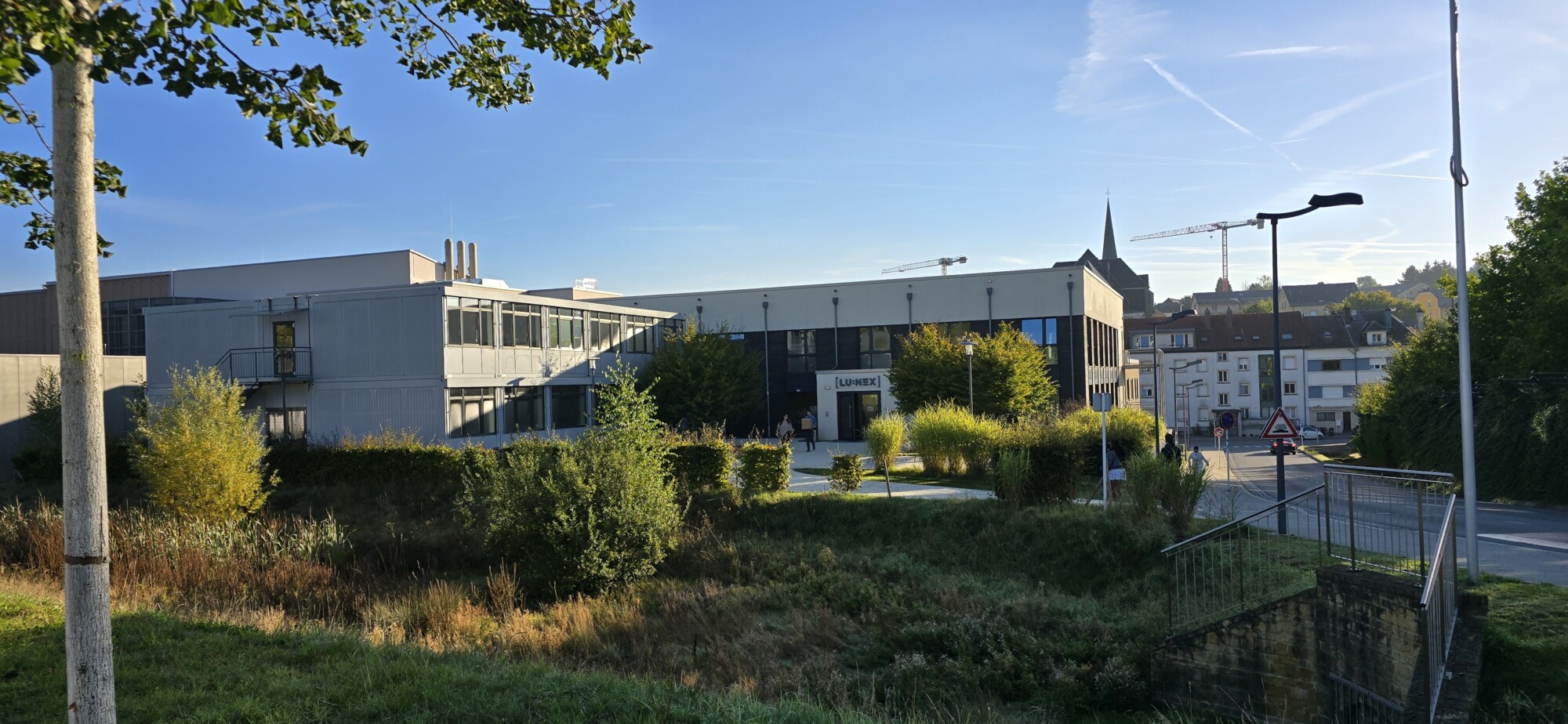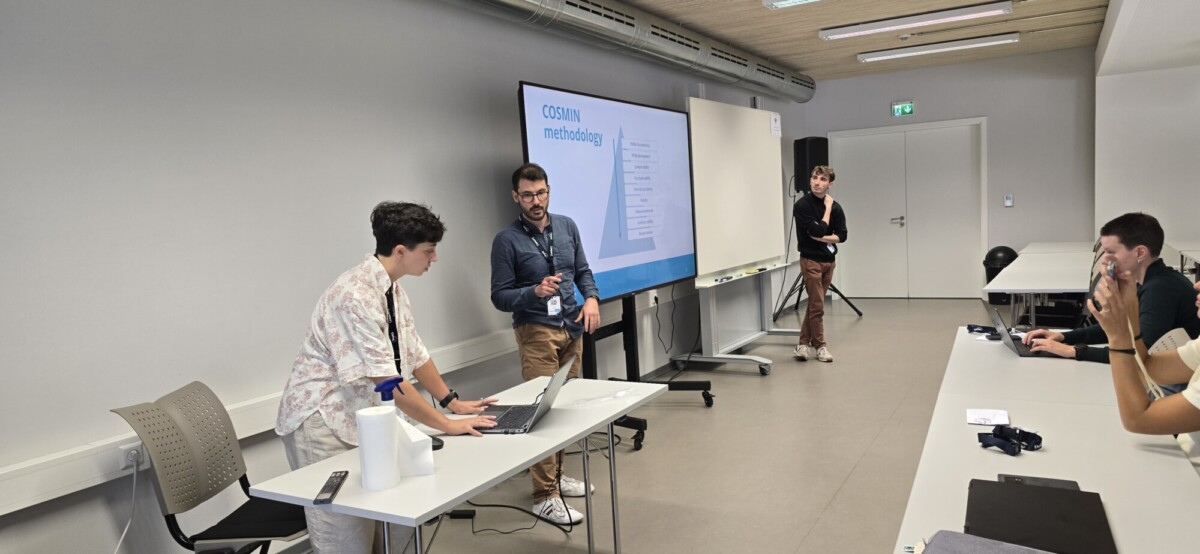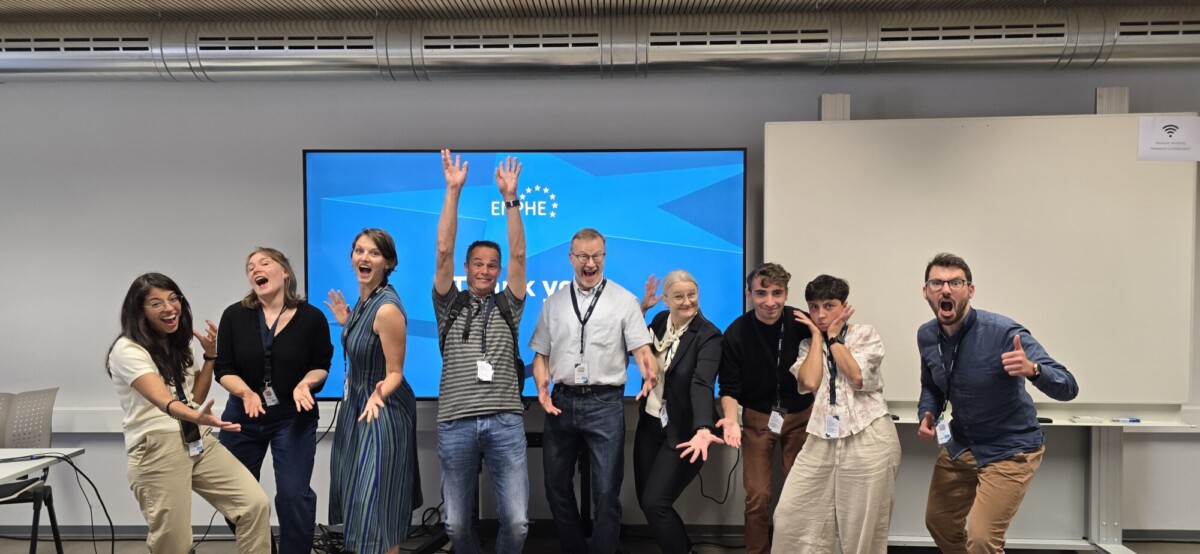
Savonia Article Pro: The Future of Physiotherapy Education: Evidence-based knowledge for teaching
Savonia Article Pro is a collection of multidisciplinary Savonia expertise on various topics.
This work is licensed under CC BY-SA 4.0
During the ENPHE Forum held in Luxembourg from September 18–20, 2025, the ENPHE Research Group actively contributed to the event’s theme “The Future of Physiotherapy Education: Trends, Challenges, and Opportunities” (European Network of Physiotherapy in Higher Education n.d.). The group presented development initiatives and results from its various sub-groups, focusing on advancing evidence-based physiotherapy (Äijö et al. 2025).
Progress of the systematic literature review
Following our scoping review published in 2023 (Boshnjaku et al. 2023) on the types of teaching sequences for EBP teaching, the question of using a relevant tool to assess an “EBP clinician profile” arises. Indeed, in order to identify the best teaching methods promoting EBP learning, it is imperative to know in advance the most relevant outcome. Nine systematic reviews have studied this topic. However, they do not study all facets of an assessment (knowledge, skills, attitudes, behavior, and self-efficacy), do not display a high AMSTAR-2 score, do not include some essential keywords, and subsequent articles are already available.

We decided to conduct a systematic review to identify the best tool to assess an “EBP clinician profile” by building a method with the best possible methodological quality. This method was developed to track most of the AMSTAR-2 items and the report follows the PRISMA 2020 recommendations. This article focuses on the five dimensions of assessing an “EBP clinician profile”. After searching multiple databases (>18), more than 32,000 articles were identified. Removing duplicates reduced this number to more than 17,000. We have completed the first phase of article selection. Some consensus is still to be reached. We have started critical reading of articles and data extraction for three tests: Fresno, Berlin questionnaire and Evidence-based practice profile questionnaire. Preliminary results so far show varying qualities of evidence regarding the different docimological criteria and lack of some assessments. This work will progress over the next year into the writing of an article. (Picture 1).
Survey for teachers on evidence-based teaching
Within the ‘Survey for teachers’ group, we developed a data collection tool, a survey, for university lecturers in Physiotherapy Universities and Universities of Applied Sciences, European countries, in order to identify the curriculum contents of evidence-based physiotherapy, of the degree in Physiotherapy among the collaborating institutions.
This research study began over a year ago, and we have been working on it since that time. Our journey to date has been: the design of the research project, its approval by the Ethics Committee of the University of A Coruña (Spain), the design of a consensus survey developed within the research group, and finally the development of a Delphi procedure.
Within this ENPHE Forum, we presented the current status of our line of research. We explained the Delphi procedure we followed in order to validate the questionnaire. We have now completed this process, and our next steps will be a pilot study and the development of the final study.
Students participating in a Blended Intensive Programme course in evidence-based physiotherapy
A Blended Intensive Programme (BIP) on Evidence-Based Physiotherapy is a short-term, collaborative educational initiative designed and implemented to bring together students and staff from different countries, within the Erasmus+ framework. This initiative started with three partners universities, Savonia University, Karlova University and Universidade da Coruña, in the first edition held in Kuopio (Finland in 2023). In the second edition, Universidad Europea de Madrid and CERRFF joined in a course celebrated in Prague (Chzec Republic in 2024).
Around 40 students from different countries have participated in each edition. Physiotherapy students mostly were undergraduate from 3rd ot 4th year but also master and doctoral level students participated along with academic staff, guest lecturers from partners institutions, providing a great environment for international collaboration. The main purpose of the “Evidence-Based Physiotherapy” BIP program is to enhance participants’ skills and knowledge in Evidence-Based Practice (EBP) in Physiotherapy. Lecturers apply a wide range of methodologies to deep into the principles of Evidence-Based Practice (EBP) in Physiotherapy, providing students with tools to critical appraise scientific literature and apply research evidence to clinical decision-making. Also, the intercultural team work facilitate a broader understanding of physiotherapy practices across countries. Students ‘feedback from previous editions is satisfactorily positive. Participants perceived a better understanding of EBP and an improvement in collaborative and communication skills. Next edition will be held in October 2025 at Universidade da Coruña (Spain), summing d´École D´Asass and Rotterdam University of Applied Sciences as new partners. (Picture 2).

Working in a research group in the future
In the forum the sessions provided a platform for sharing ongoing research, discussing methodological approaches, and fostering collaboration among European higher education institutions. Participants engaged in meaningful dialogue around current challenges and future directions in physiotherapy education, reinforcing the importance of research-driven development in the field (Picture 3).

In the future, the research group aims to invest in evidence-based physiotherapy from both the teachers’ and students’ perspectives. These efforts will lay the foundation for developing evidence-based teaching practices, ensuring that graduating physiotherapists are better equipped to work in a client-centered manner.
Writers:
Marja Äijö PhD, principal lecturer of gerontology and rehabilitation, Savonia University of Applied Sciences
Adrien Pallot, PT,MsC lecturer of physiotherapy (IFMK Assas, University of Picardie)
Hugo Nabais, physiotherapy students (University of Picardie)
Simon Desmazières, physiotherapy students (University of Picardie)
Clémence Boucher, physiotherapy students (IFMK Assas)
Maxence Sicard, physiotherapy students (IFMK Assas)
Merita Qorolli, PT, PhD, Prof. Ass., Department of Physiothera-py Faculty of Medicine, University of Prishtina, Republic of Kosovo
Verónica Robles García, PhD, MSc, PT, OT. Lecturer at Department of Physical Therapy, Medicine and Biomedical Sciences, Faculty of Physiotherapy and Researcher at the Neuroscience and motor control group, Universidade da Coruña and Biomedical Institute of A Coruña, Spain
Zeltia Naia, Prof, PhD, MSc, PT. Faculty of Physiotherapy, University of A Coruña, Spain
References:
Boshnjaku A, Arnadottir AS, Pallot A, Wagener M, Äijö M. 2023. Improving the Evidence-Based Practice Skills of Entry-Level Physiotherapy Students through Educational Interventions: A Scoping Review of Literature. Int. J. Environ. Res. Public Health 2023, 20(16), 6605; https://doi.org/10.3390/ijerph20166605
European Network of Physiotherapy in Higher Education (ENPHE) (n.d.). ENPHE official website. Retrieved October 1, 2025, from https://www.enphe.org/en
Äijö M, Wagener MN, Pavlů D, Pallot A, Qorolli M, Multanen J, Zeltia N. 2025. ENPHE – Eurooppalainen yhteistyö näyttöön perustuvan fysioterapiakoulutuksen kehittämiseksi. Fysioterapia 5, 52–53